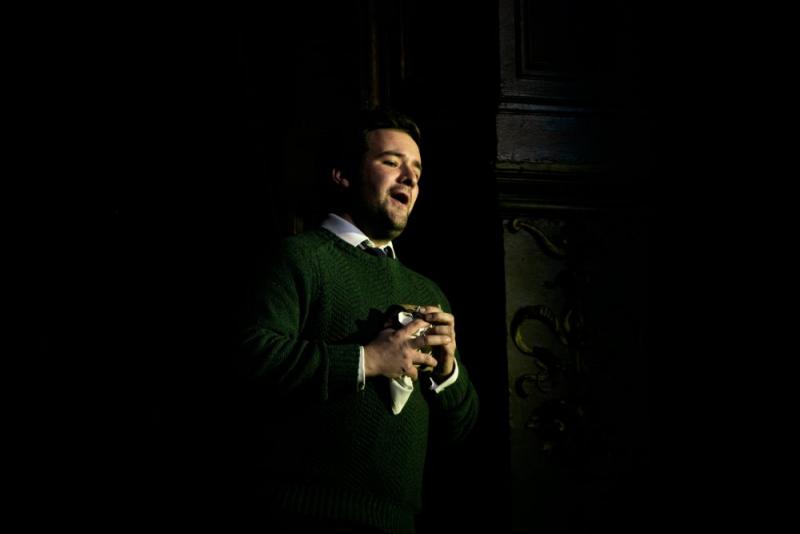St John Passion, English Touring Opera, Lichfield Cathedral review - free-range Bach doesn't quite add up | reviews, news & interviews
St John Passion, English Touring Opera, Lichfield Cathedral review - free-range Bach doesn't quite add up
St John Passion, English Touring Opera, Lichfield Cathedral review - free-range Bach doesn't quite add up
Fresh musical values transcend diffuse direction as sacred drama hits the road

JS Bach’s Passions as music theatre? Well, why not? Whatever the aura of untouchability around these works, they were always conceived as part of a bigger picture: a communal sacred ritual in which the divide between performer and audience wasn’t so much blurred as nonexistent.
Anything that gets us closer to that experience surely serves Bach’s ends; at any rate, something needs to be done to break these works out of the curious sterility of so many modern concert performances or the frosty purity of the recording studio. In that light, English Touring Opera’s decision to tour the St John Passion in a semi-staged form directed by James Conway is a step in the right direction, whatever the practical limitations.
ETO is touring the Passion to 10 venues (many, but not all ecclesiastical) over the next few weeks, collaborating with locally based choirs in each location. On this first night in Lichfield Cathedral, there were no fewer than five amateur choruses, all more or less closely related to the Cathedral community and its school, and arranged on three sides around a central platform, on which stood conductor Jonathan Peter Kenny and the period instrument forces of the Old Street Band. With choral singers to left, right and centre, and extending some way down the sides of the nave behind him, Kenny’s athletic gestures were physical theatre in their own right. He also marshalled seven soloists, all of whom seemed at liberty to move, gesticulate and reposition themselves pretty much at will.
That was certainly the effect, anyway. Conway and his team have gone to some pains over the text; surtitles are provided, and for each of the chorales – the only sections of the work that are sung in English – new translations have been commissioned from eminent spiritual thinkers, including AL Kennedy and Dr Rowan Williams. (There’s an entertaining parlour game to be had there – who’ll be the first to guess that the line "Drenched in spit and mockery" was penned by Giles Fraser?). The soloists wear mufti, and Conway presents them as members of a spiritual community: bearing witness, exhorting the audience, hugging and occasionally drifting off into the outlying regions of the cathedral to deliver an aria (literally) from the pulpit. The orchestra is part of the process, too: oboists and flautists rise to their feet at key moments, and a violinist clambers down to seek reassurance from one of the singers.
Presumably this is the component of the production that will travel, adapting to venue and circumstances as it goes – though it’s worth saying that even in the cathedral acoustic, the Lichfield choirs managed an impressive clarity of attack and enunciation, and rose with gusto to Kenny’s brisk, dance-inflected tempos. It genuinely felt like an unfolding drama, and might have done so even more had specific singers been permitted to sing specific roles. The part of the Evangelist was shared out between all seven soloists, requiring some quickfire transitions which – like everything in the performance – Kenny handled with absolute assurance. With no indication in the programme book or surtitles, it was impossible to know which of the two tenors and two basses (Richard Dowling, Thomas Elwin, Edward Hawkins and Bradley Travis) was singing at any given moment. Overall, they were a fresh-sounding, warmly communicative team.
Martha Jones’s shaded mezzo blended poignantly with the understated continuo section, and soprano Luci Briginshaw sounded bright and taut with emotion. But countertenor Tim Morgan found the moment around which the whole thing revolved, singing "Es ist Vollbracht" with a poised inwardness and a haunted, aching sense of desolation that made the huge, silent space above him seem, if anything, too small. Your experience will differ, of course, but I wasn’t convinced that Conway’s well-meant but fidgety free-range direction heightens rather than diffuses Bach’s power. Something felt unfocused, though it certainly wasn’t the singing or playing. Perhaps the drama will ignite as the tour continues, but meanwhile the musical fundamentals are solid. If all else fails, you can always close your eyes.
rating
Share this article
The future of Arts Journalism
You can stop theartsdesk.com closing!
We urgently need financing to survive. Our fundraising drive has thus far raised £49,000 but we need to reach £100,000 or we will be forced to close. Please contribute here: https://gofund.me/c3f6033d
And if you can forward this information to anyone who might assist, we’d be grateful.

Subscribe to theartsdesk.com
Thank you for continuing to read our work on theartsdesk.com. For unlimited access to every article in its entirety, including our archive of more than 15,000 pieces, we're asking for £5 per month or £40 per year. We feel it's a very good deal, and hope you do too.
To take a subscription now simply click here.
And if you're looking for that extra gift for a friend or family member, why not treat them to a theartsdesk.com gift subscription?

Add comment